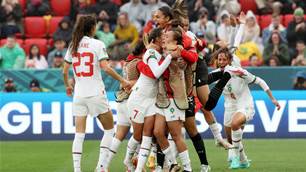Who needs the games? Sports fans can get their kicks from the salary cap.
Who needs the games? Sports fans can get their kicks from the salary cap.
 Who needs the games? Sports fans can get their kicks from the salary cap.
Who needs the games? Sports fans can get their kicks from the salary cap.Image: Getty Images
The decisive moment is approaching in the National Basketball Association, with its finals unfolding in the coming weeks. The NBA Play-offs are a wonderful period of the sporting calendar, hoops played with such raw intensity in a format akin to a stress test. But even to the game’s fans, this year’s play-offs have been relegated to sideshow – the main act comes afterward, and is the culmination of a story that has unfolded over seven years. Which team will LeBron James decide to play for in 2011?
It’s like a meta-NBA competition has been playing out. Who cares who wins the 2010 championship compared to winning the LeBron sweepstakes, and the long-term future success it entails? It’s the game of basketball on one side, and the game of salary cap management on the other.
The salary cap has become a ubiquitous feature of the professional sporting landscape, rather unfortunately for the Melbourne Storm. It’s a socialist mechanism that’s gained remarkable traction in a supremely commercialised, free-market atmosphere. It helps to maintain a semblance of competitive balance in a league by preventing wealthier clubs from just spending their way to the top. The NBA’s cap regime is the longest established, dating back to 1984 (the AFL and rugby league were notable early adopters, introducing theirs in the late ’80s). It’s since evolved into the most Byzantine of systems, so full of loopholes that it’s known as a “soft” cap. In the last few years, it’s become the entire focus of teams hoping to lure LeBron upon the end of his contract with the Cleveland Cavaliers this season.
The term “clearing cap space” has entered the NBA lexicon. To afford LeBron’s salary (league rules set out a maximum tied to years of service, in James’ case 30 percent of the cap, or roughly US$17 million a year), teams have consciously taken huge backward steps that make those occasional tanking controversies in football look quaint. Generally, teams would trade for a player to help them on the court; now, they make trades with no intention of using the player at all, but instead want a player whose contract is expiring – money coming off the cap.
In New York, one of LeBron’s possible destinations, every salary dump was greeted with high praise. In their recent history, the Knicks have been the biggest spending, most underperforming team in the league. The Knicks’ win-loss record became secondary to the state of their payroll. James may well decide to spurn the Big Apple, but the fans of New York at least have the consolation that the all-important salary cap is being better managed.
In one sense, the salary cap has become another contest to win, a way for the business side of the team to show how they’re better than the rest of the league. That it’s become a game within the game gives it a sporting quality and takes the edge off the fact we are celebrating collusive wage suppression – we’d cry foul in a heartbeat if we came across it in our own working lives.
It brings to mind one classic Seinfeld episode in which the show’s faux-owner of the New York Yankees, in a fit of pique, trades George Costanza to Tyler Chicken. It’s an uproarious comic device, even by Seinfeld’s high standard, because it speaks to how work practices in pro sports really are abnormal. Imagine if Bob over the partition got a pay rise, and you had to be let go to keep the office under the salary cap?
– Jeff Centenera
Related Articles

Opinion: Why not a World Cup?

Perfect Lionesses: England's flawless World Cup start punctuated by a sublime attacking display













